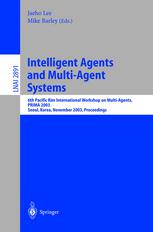

Most ebook files are in PDF format, so you can easily read them using various software such as Foxit Reader or directly on the Google Chrome browser.
Some ebook files are released by publishers in other formats such as .awz, .mobi, .epub, .fb2, etc. You may need to install specific software to read these formats on mobile/PC, such as Calibre.
Please read the tutorial at this link: https://ebookbell.com/faq
We offer FREE conversion to the popular formats you request; however, this may take some time. Therefore, right after payment, please email us, and we will try to provide the service as quickly as possible.
For some exceptional file formats or broken links (if any), please refrain from opening any disputes. Instead, email us first, and we will try to assist within a maximum of 6 hours.
EbookBell Team

4.1
10 reviewsFive years ago, with excitement and uncertainty, we witnessed the birth of PRIMA (Paci?c Rim International Workshop on Multi-Agents). The ?rst PRIMA in 1998 has now grown into PRIMA 2003, the 6th Paci?c Rim Inter- tional Workshop on Multi-Agents in Seoul, Korea. During a period of ?ve years, the notion of agent research has grown so much that we hear the term agent on a daily basis. Various ?elds such as business, the Web, software engineering, on-line games and such are now using the term agent as a placeholder, just like the term object is used in the object-oriented paradigm. On the other hand, the research area has extended toward real applications, such as the Semantic Web and ubiquitous computing. The themes of PRIMA 2003 re?ected the following trends: – agent-based electronic commerce, auctions and markets – agent architectures and their applications – agent communication languages, dialog and interaction protocols – agent ontologies – agent programming languages, frameworks and toolkits – agentcities – agents and grid computing – agents and peer computing –agentsandtheSemanticWeb – agents and Web services – arti?cial social systems – con?ict resolution and negotiation – evaluation of multi-agent systems – languages and techniques for describing (multi-)agent systems – meta modeling and meta reasoning – multi-agent planning and learning – multi-agent systems and their applications – social reasoning, agent modeling, and organization – standards for agents and multi-agent systems – teams and coalitions – ubiquitous agents